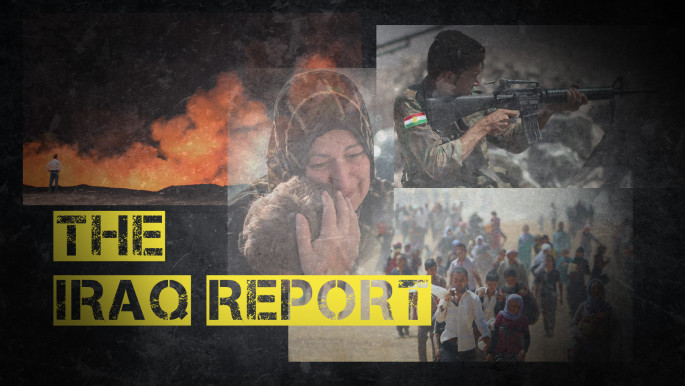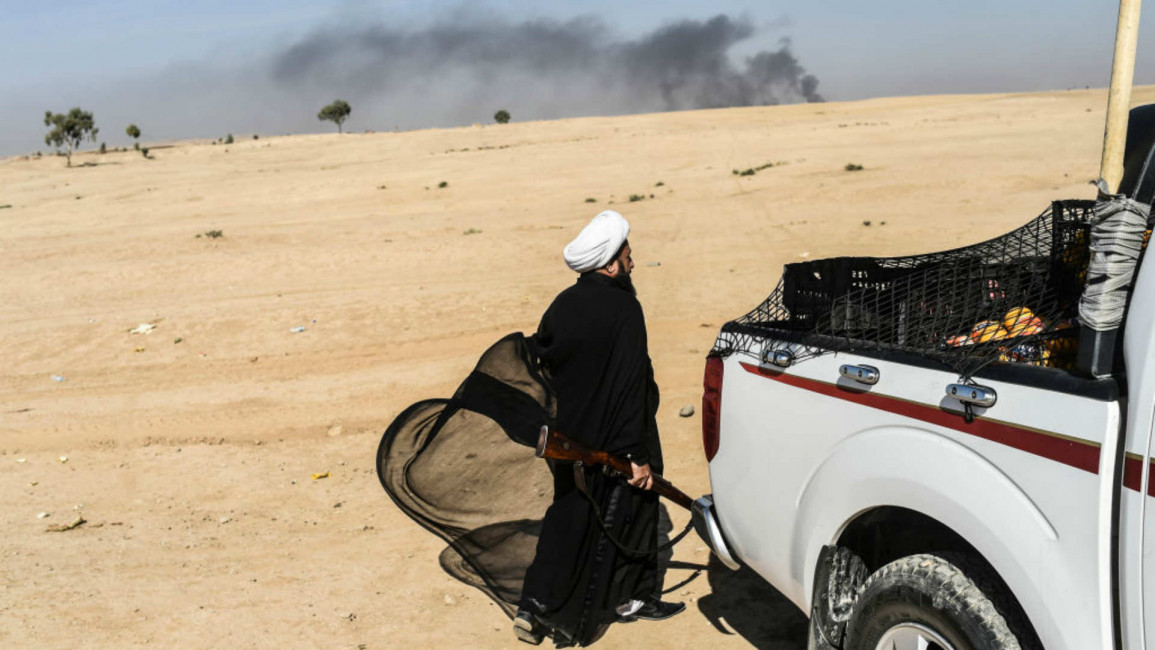
After Mosul, Iran-backed militias will ensure sectarian violence endures
Photographs showed semi-clothed people looking haggard, malnourished and afraid. The smell of rotting flesh betrayed the presence of those who still remain under the rubble of buildings, levelled during the nine-month operation to "liberate" the once vibrant city from the jihadist organisation.
For the citizens of Mosul, however, the ordeal has not ended with the expulsion of IS. Since the Battle of Mosul began in October, observers have reported that Iraqi government forces or allied militias have engaged in summary executions of people accused of IS membership, without evidence or trial.
In one video, a handcuffed man is beaten and slapped to the floor by several soldiers, before being shot in the head at point-blank range. In another, an alleged IS fighter is thrown from the top of a building on to the body of another man below, whose lifeless figure is then shot at.
The tactic is reminiscent of IS itself, who released videos of members pushing men accused of homosexual acts from high-rise buildings to their deaths.
Though some of these extrajudicial killings have been carried out by the Iraqi army, many more are the work of the Hash’d al-Shaabi, or Popular Mobilisation Forces, a fractious group of militias up to 140,000 strong who work outside government structures and whose allegiances often lay with Shia religious clerics rather than Baghdad.
Such killings are often therefore sectarian in nature, rather than political.
Who are the PMF?
In June 2014, IS over-ran Mosul in northern Iraq, sending thousands of under-trained and under-equipped Iraqi forces fleeing in the face of a comparatively low number of Sunni jihadists. At the time, a genuine fear that the organisation could reach Baghdad led tens of thousands of Iraqis to volunteer to fight.
 |
Although the PMF includes multi-ethnic and multi-religious militias, its outlook is overwhelmingly pro-Shia |  |
With confidence in the Iraqi army at rock bottom following the massacre of more than 1,500 Shia recruits at Camp Speicher, popular militias were formed to take the fight to IS.
Many of these groups were united in deep-seated Shia beliefs, though remained far from a cohesive force. Some, such as the Badr Organisation and Asa'ib Ahl al-Haq, were already well-established pro-Iranian Shia paramilitary groups, veterans of the Iran-Iraq War in the 1980s and the civil war in the mid-2000s.
Others formed or re-formed from a religious fatwa issued by the cleric Ali al-Sistani, while more still were loyal to prominent cleric Muqtada al-Sadr's re-mobilised Peace Companies.
In addition to this religious sanctioning of the PMF, then-Prime Minister Nouri al-Maliki signed an official decree to make it legal for such forces to fight against IS.
 |
|
Although the PMF includes multi-ethnic and multi-religious militias, its outlook is overwhelmingly pro-Shia.
Most disconcerting among these groups are the pro-Iranian cohort, who, despite fighting alongside Iraqi forces in the name of saving Iraq, are funded and trained by Iran, professing allegiance to Iranian Supreme Leader Ali Khamenei.
Their stated goal is to encourage and spread Shia-Iranian influence within the Iraqi state, a task that has become beset with inherent sectarian violence against Sunnis. Many of these militias, such as Liwa Abu al-Fadl al-Abbas, are also fighting in the Syrian theatre alongside Hizballah to prop up Syrian President Bashar al-Assad on behalf of Iran.
| Read more: What next for Iraq's controversial Shia militias after Mosul victory? | |
Despite the overwhelming evidence of war crimes, the importance of PMF Shia militias in the fight against IS is difficult to deny.
Just last year, Prime Minister Haider al-Abadi announced plans to officially incorporate the PMF into the Iraqi armed forces, citing their significant contribution to fighting IS. However, despite being a supplementary force to the still fledgling Iraqi army, the PMF act with increasing impunity.
They have frequently criticised Abadi, knowing that the Iraqi leadership is too weak to decisively act when such groups carry out atrocities like those being witnessed in the aftermath of Mosul’s liberation. Highlighting this was Abadi's statement in October that the PMF would not be allowed to enter Mosul - only for thousands to flow in.
Speaking this week, Abadi conceded that the PMF would take part in a new offensive to liberate the Sunni-Turkmen town of Tal-Afar.
Sectarian breeds sectarianism
As the battle to re-take Mosul began to wind down following Abadi's declaration of victory on July 10, the sheer extent of brutality by anti-IS forces began to emerge. A steady flow of unidentified and decomposing corpses, bound at the wrists, floated downstream from Mosul to Qayyarah, 60km south.
 |
The presence of the PMF in the battle for Sunni-majority northern Iraq ensures that each battle takes on a deeply sectarian form |  |
Human Rights Watch reported that the US-trained 16th Division of the Iraqi Army had summarily executed several men before confiscating photographic evidence taken by observers. An anonymous report featured an interview with an Iraqi soldier who relayed his unit's actions in the final days of the battle: "We killed them all. Daesh, men, women and children. We killed everyone."
The presence of the PMF in the battle for Sunni-majority northern Iraq ensures that each battle takes on a deeply sectarian form. In Mosul, as will be the case in Tal-Afar, many civilians were likely killed for their Sunni denomination rather than any demonstrable support for IS.
In Iraq, as in Syria and Libya, IS has attempted to achieve legitimacy by taking advantage of increased sectarian tensions and state-led Sunni oppression, whether perceived or real. Although now on the back foot, the presence of Iranian-backed PMF forces working alongside the government means that IS will continue to have a way to recruit and dominate ostracised Sunni populations, ensuring the cycle of sectarian violence continues.
Aaron Noonan is a Middle East analyst from Ireland, focusing on Syria, Iraq and Western military engagement in the region. He writes a blog here.
Follow him on Twitter: @custerdome
Opinions expressed in this article remain those of the author and do not necessarily represent those of The New Arab, its editorial board or staff.



